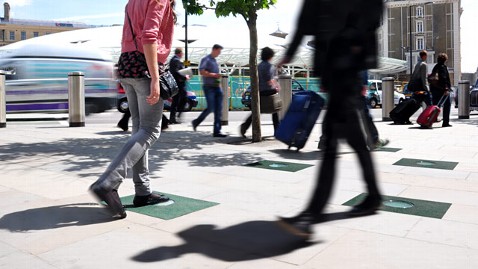Tiles Harness Footsteps to Generate Electricity

Pavegen tiles in action (Image credit: Pavegen)
What if you could help power a whole city by going for a walk, or generate real electricity by doing the electric slide? Now, thanks to one London-based start-up, you can. The company is called Pavegen Systems, and it's generating sparks across Europe thanks to a green energy technology which harnesses the power of the pedestrian.
The technology consists of a rubber tile, 17.7-by-23.6-inches (45 x 60 centimeters) in size. When stepped on, the tile bends slightly, around 5 millimeters (only one fifth of an inch), harvesting the kinetic energy generated by the footstep and converting it into usable electricity at a rate of about 7 watts per footstep. At that rate, it takes only five tiles to power a small storefront, or light up the streetlamps on a relatively busy street, according to the Laurence Kemball-Cook, the company's CEO.
Kemball-Cook first conceived of the tile when he was working towards as degree in industrial design and technology at Loughborough University. As part of his studies, he worked at a London power company, where he was tasked with developing solar and wind power solutions for urban areas. When neither proved viable, he started exploring alternative options. "I thought, what about a power source that is commercial and reliable, where and when you need it?" Kemball told ABC News, "what about footsteps?"
Well, what about footsteps? According to Kemball-Cook the tiles are "200 times more efficient than any other form of other energy harvesting technology." In addition, they're non-invasive, if desired, they can be made to blend in completely with the surrounding street.
"It provides a way that people can save energy without realizing it," Kemball-Cook said, "all they have to do is walk down the road." Because it comes from people as opposed to fossil fuels, the energy is eco-friendly, leaving behind little to no negative effect on the planet. Even the tiles themselves are recycled, coming primarily from old truck tires which have been refitted for the purpose. "We're taking tires off the road and putting them back on the road," Kemball-Cook told ABC News.
Pavegen already has numerous temporary and permanent projects underway in Europe. The company is currently installing tiles in one of the largest malls in Europe, the Westfield Stratford City Mall. Already a hot spot for heavy foot traffic, the mall is expected to receive an influx of visitors this year given its close proximity to the Olympic Stadium. They're also set to power the lighting for major London transportation hub.
But Pavegen's plans go far beyond city streets, they have also set up temporary tiles at music festivals, such as England's Bestival in 2011, which dancers can use to charge cell phones. On May 19, 2012 the Black Eye Pea's Apl.de.ap and Will-i-am performed on a Pavegen energy generating stage, during a fund raising event for Apl's 'We Can Be Anything' campaign, reducing the need for fossil fuel-powered generators, which are traditionally used to power large outdoor events.
Although Pavegen does most of its business in Europe, the company is in talks with buyers in Silicon Valley who are looking to provide clean energy for their offices using Pavegen tiles. As the business continues expands, the company is aiming to get its prices, which are currently in flux, down to $100 per tile, a goal which they expect to reach in the next 18 months. In the meantime, the company will keep its eyes on the prize, powering the world, one step at a time.